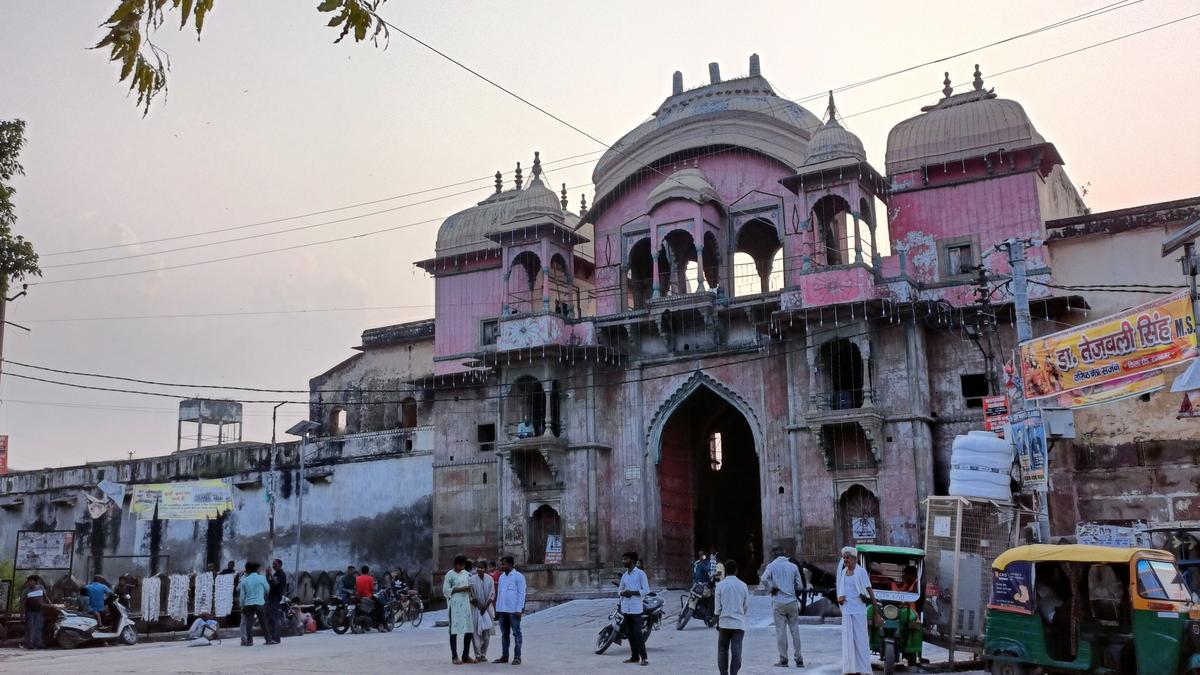The Ramnagar Fort in Varanasi that plays host to the 200-year-old Ramlila.
| Photo Credit: Special Arrangement
Follow the elephant, we are told. Anant Narayan Singh, the Maharaja of Ramnagar, seated atop a caparisoned elephant, and other members of the royal family, move to a site on the Ramlila maidan where Meghanad’s (Ravana’s son’s) death is to be staged.
At the maidan, the entire community of Ramlila enthusiasts is present with the Ramcharitmanas and a torch in their hands. In one corner of the audience is a group of turbanded singers with pakhawaj, reciting sections of the Ramcharitamanas.
As the singers sing, the samvad (dialogue) begins. “Chup raho…saavdhaan”, says the conductor of the event, who is also the official prompter of the spectacle.
A group of singers with Pakhawaj reciting sections from the Ramcharitmanas during the ramlila spectacle.
| Photo Credit:
Special Arrangement
It is that time of the year in Varanasi when the entire place turns into a stage with multiple venues. It is the third week of Ramlila, and around 12 of us, theatre practitioners from different parts of India, have come here to experience the visual feast.
Larger-than-life figures assume the role of demons at the Ramnagar Ramlila spectacle.
| Photo Credit:
Special Arrangement
A huge effigy of a smiling Meghanad, who is also a major disguiser (behrupiya), is being brought to the central space. There are four more behrupiya rakshasas in effigy blocking Meghnad. A young boy who dons the role of Lakshman comes to duel with the huge effigy. He keeps going back and forth, shooting arrows at each disguised form in front of Meghnad, who is hiding behind them. Finally, Lakshman strikes down Meghanad, and he is burnt.
While the effigies represent the rakshasas, Ram, Lakshman and Hanuman are played by people.
| Photo Credit:
Special Arrangement
Mourning follows, and women congregate to cry for Meghnad. That happens in the section reserved for Lanka, and the entire crowd walks to that point.
There are three elements to this performance tradition that is held for a month in Varanasi. The collective reading, the dialogue and the rest of the spectacle. “You either focus on the music or the dialogue. You can’t be here or there. Then, you won’t understand anything,” a singer tells us. While a Pakhawaj player shares: “This has been happening for over 200 years. The cast is chosen by the Maharaja, and they rehearse for at least two months.”
Larger-than-life figures assume the role of demons while Ram, Lakshman and Hanuman are played by people. Thousands congregate around the maidan to witness the final aarti.
On our way back, at a juice shop, the owner of the shop tells us that around midnight, Naak Katana (nose cutting of Shoorpanaka) would take place in the area called Lanka in Varanasi. “Do you think Shoorpanakha’s mutilation was fair?” I ask a woman. “She was the reason for war. She is important. If not, how will Ravana get killed by Rama, how will he get moksha?” she justifies.
Elsewhere, veteran actor Manoj Pandey charms the audience around him. Around him are the small rakshasas, a noisy bunch of kids who are just happy running from one end of the street to another. The scene to be staged is a duel between Shoorpanaka’s cousins Khara-Dushan (played by Pandey), and Ram. Pandey has been a Ramlila thespian for the past four decades. He switches off from his act with finesse and tells us that this is sadhana (devotion) for him. “I belong to the Aghora spiritual tradition. The rigour of that practice feeds my acting too,” he says.
On the last day of our Ramlila journey, we come early, like thousands of others, to watch the Ravan Dahan. The 10-headed king of Lanka towers over all of us. There is something so regal about him one cannot quite describe in words. Here is a man who lived a life rich in music, war and desire.
After what felt like many hours of waiting, the crowd moves towards the corner of the maidan we now know as Lanka. And there he is, bursting into flames, as Vibheeshana sets fire to him. The smile in his eyes is replaced by the glow of fire. Soon, the entire figurine lights up, and a hot air balloon carrying a flame takes off. “That’s Ravan’s spirit, attaining salvation, after being killed by Ram,” a spectator remarks. The vivacious king is now a burning memory.
Published – November 18, 2024 09:59 pm IST
